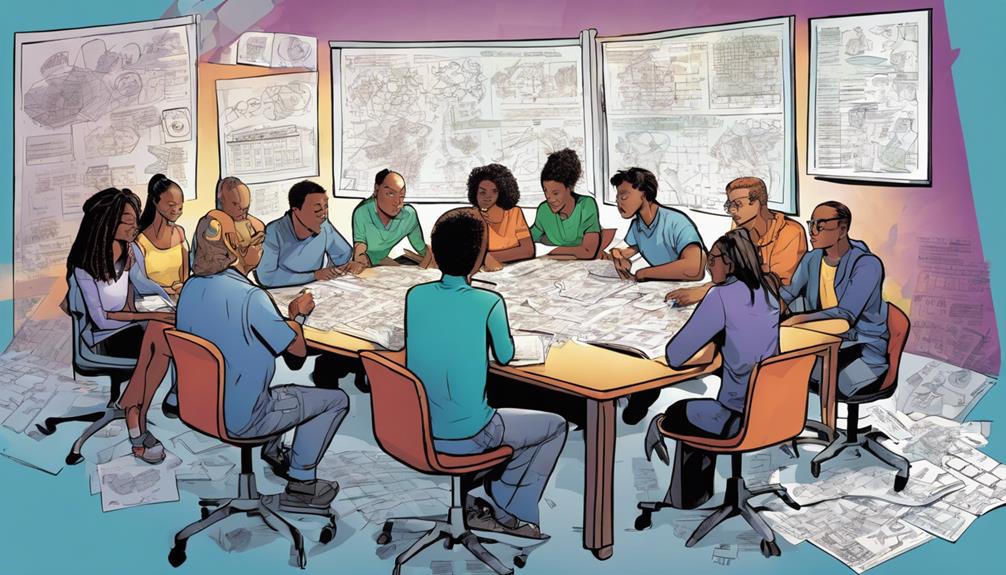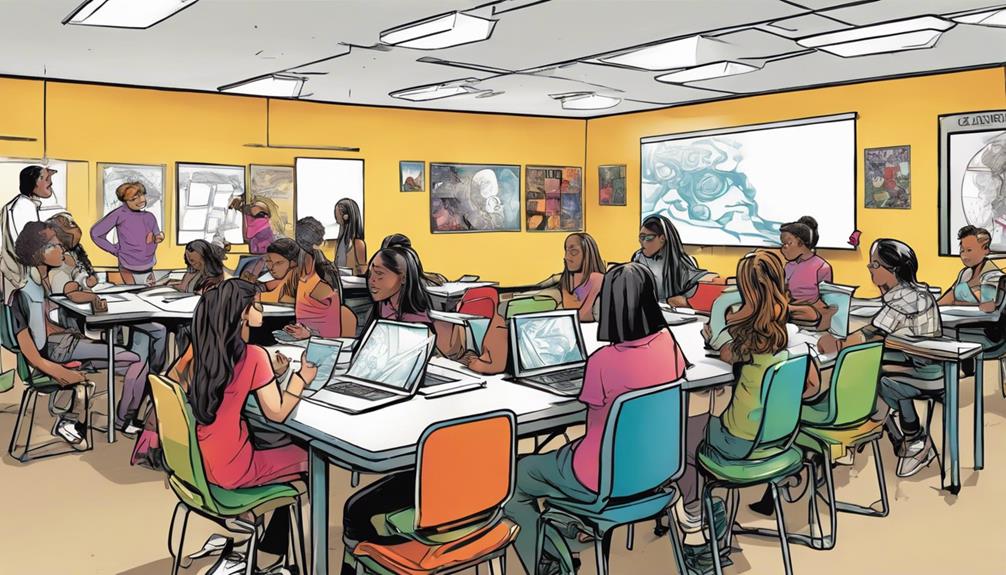Understanding numeracy is essential for financial decisions, career advancement, and overall well-being. It plays a crucial role in managing savings, making informed financial choices, and analyzing business data. Weak numeracy skills can impede job opportunities, limit promotions, and affect mental health adversely. Research indicates that poor numeracy skills disproportionately impact women, leading to unemployment and reduced self-esteem. Numeracy is more crucial for paid employment than literacy and is linked to physical health and home ownership. To explore the full extent of numeracy's importance and its impact on various aspects of life, continue through the detailed analysis provided.
Key Takeaways
- Numeracy is essential for financial decisions, career advancement, and overall well-being.
- Weak numeracy skills can hinder employment, limit promotions, and impact mental health.
- Research shows poor numeracy skills disproportionately affect women, leading to unemployment and lowered self-esteem.
- Numeracy is more crucial for paid employment than literacy and is linked to physical health.
- Understanding numeracy is crucial for managing savings, making sound financial choices, and analyzing business data.
Importance of Numeracy
Understanding the significance of numeracy is fundamental to maneuvering everyday financial decisions, career opportunities, and overall well-being.
Mathematics plays an essential role in managing savings, making sound financial choices, and analyzing business data.
Weak numeracy skills can hinder employability, limit promotions, and impact mental health.
Research suggests that poor numeracy skills disproportionately affect women and can lead to unemployment and lowered self-esteem.
Numeracy is more important for paid employment than literacy and is even linked to physical health and home ownership.
Numeracy Crisis

The prevalence of weak numeracy skills, as evidenced by consistently disappointing GCSE mathematics scores in the UK, highlights a significant challenge known as the Numeracy Crisis.
Recent data reveals that only 3.5% of students achieved the top grade 9 in mathematics, reflecting an important trend in educational outcomes. Global IGCSE results mirror this pattern, with a similar 3.5% achieving the highest grade.
Moreover, PISA rankings indicate that Asian countries consistently outperform the UK in mathematics, emphasizing the urgency of addressing numeracy issues.
Weak numeracy skills not only affect academic performance but also impact employment opportunities, career advancements, and mental well-being.
Addressing the Numeracy Crisis is vital to ensure individuals are equipped with the essential mathematical skills needed for success in various aspects of life.
Strategies for Improvement

To enhance numeracy skills, educators can implement various strategic approaches aimed at improving mathematical proficiency among students.
Incorporating graphs and tables in various subjects can help quantify data, while utilizing tutor time for arithmetical skill development through online programs is beneficial.
Teaching mathematical language alongside subject content, using tools like Venn diagrams and timelines in subject-specific contexts, and coordinating with the math department to reinforce key concepts across subjects are effective strategies.
By integrating these methods into the curriculum, students can develop a stronger foundation in mathematics, enhancing their numeracy skills and overall academic performance.
These strategies aim to address the numeracy crisis by providing students with the necessary support and resources to excel in mathematical proficiency.
Richard Rogers Online Community Benefits

Richard Rogers Online Community provides educators with a valuable platform to connect, share resources, and engage in discussions on numeracy and teaching strategies.
Access daily updates on Facebook and Twitter.
Stay connected with the latest news and information.
Engage with a supportive online community.
Share resources and teaching strategies.
Connect with like-minded educators.
Ways to Share Content

Exploring various avenues for dissemination can enhance the reach and impact of valuable educational content on numeracy and teaching strategies.
To effectively share content, educators can utilize social media platforms like Twitter and Facebook, engaging with a wider audience and encouraging interaction. Additionally, exploring other sharing options within these platforms can further amplify the dissemination of numeracy resources.
Offline sharing remains relevant, with the option to print and distribute materials to reach individuals who may not have online access. Encouraging others to share the content can create a ripple effect, expanding the reach exponentially.
Frequently Asked Questions
How Can Parents Actively Support Their Children's Numeracy Skills at Home?
To actively support their children's numeracy skills at home, parents can integrate math into daily activities, use math-based games and puzzles, encourage questions, seek online resources, and communicate with teachers for additional support.
What Impact Does Numeracy Proficiency Have on Career Advancement Opportunities?
Numeracy proficiency greatly influences career advancement opportunities. Strong math skills enhance problem-solving abilities, analytical thinking, and decision-making in various professions. Individuals with robust numeracy skills are better positioned for promotions, higher salaries, and leadership roles.
Are There Any Free Online Resources Available to Improve Numeracy Skills?
Several free online resources are available to enhance numeracy skills. Platforms offering tutorials, practice exercises, and interactive tools like Khan Academy, Coursera, and Mathway can help individuals strengthen their mathematical abilities conveniently and at no cost.
How Can Educators Address Math Anxiety in Students to Enhance Numeracy?
To enhance numeracy, educators can address math anxiety in students by fostering a supportive learning environment, providing personalized assistance, integrating real-world applications, and promoting positive attitudes towards mathematics. Embracing a growth mindset can transform math anxiety into confidence and competence.
What Role Can Technology Play in Enhancing Numeracy Skills in Learners?
Technology plays a pivotal role in enhancing numeracy skills in learners by offering interactive tools, online programs for skill development, and real-time feedback. Incorporating technology in education fosters engagement, boosts understanding, and facilitates personalized learning experiences.
Conclusion
To sum up, numeracy skills are essential for successfully maneuvering through the complexities of our data-driven world.
By addressing the numeracy crisis through strategic approaches and leveraging technology for skill development, individuals can enhance their proficiency in mathematics.
The Richard Rogers Online Community offers valuable resources for improving numeracy, fostering individual success and societal progress.
Embracing numeracy is not just a choice, but a necessity for thriving in today's society.










